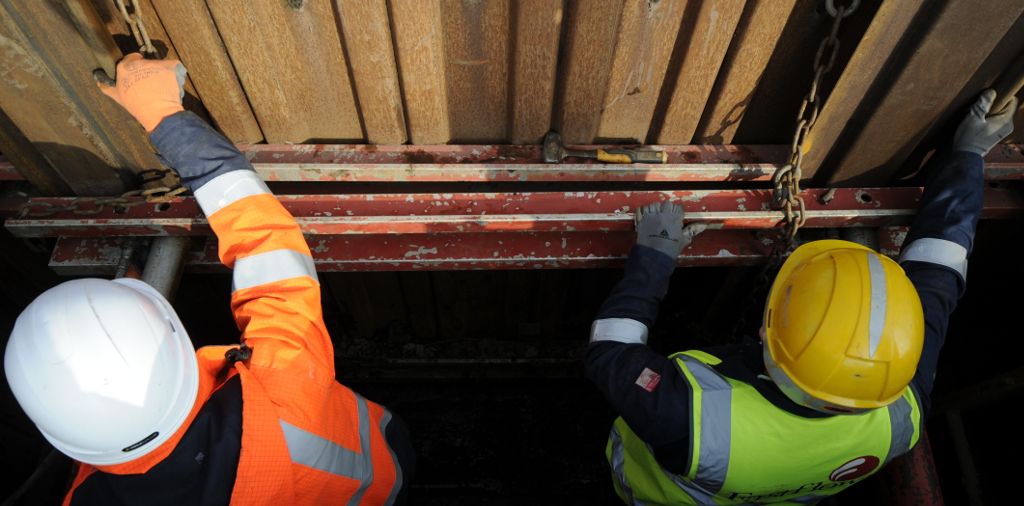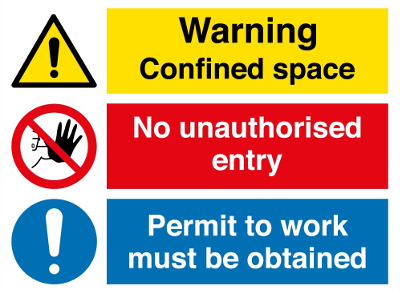Compliance

Trench Support

The aim of this course is to provide candidates with the knowledge and skills required to safely support excavations, up to 2.5 metres in depth, using timber and steel systems and identify hazards associated with work in deep excavations.
On successful completion of the course, candidates will be awarded an SQA Level 2 Certificate in 'Trench Support Systems'
On completion of the course, delegates should be able to:
- Describe current safety regulations and requirements relating to support of excavations.
- Identify the characteristics of principle soil types and associated hazards.
- Recognize the hazards and implement control measures for those hazards.
- Carry out risk assessments on a deep excavation.
- Use basic tools and equipment for installing shoring.
- Install shoring systems using the correct method appropriate for different types of ground conditions.
- Withdraw support systems in the correct sequence.
- Understand emergency procedures.
- Carry out the above tasks safely.
Course Duration 2½ Days
Manual Handling
The Manual Handling Operations Regulations 1992 require employers to ensure that all employees are trained and competent in manual handling.
Manual handling accidents account for more than a third of all accidents reported each year to the enforcing authorities. It is estimated that in excess of 500,000 people in Great Britain suffer from a musculoskeletal disorder (MSD) mainly affecting the upper limbs or neck that was caused, or made worse, by their current or past work.
This Manual Handling Training Course provides the necessary information and training for organisations to understand more about the risks associated with manual handling, how to undergo a risk assessment and how to ensure appropriate control measures are put in place.
Course Duration; 1 day
Abrasive Wheels
Our abrasive wheel training courses are suitable for all operators, managers and supervisors, who as part of their working duties select, mount, specify or use abrasive wheels as defined in PUWER Regulations 1998.
The aim of the Abrasive wheels training course is to enable candidates to work safely, to provide an understanding of current legislation and promote awareness of the dangers and hazards of abrasive wheels, and to offer practical steps to reduce workplace accidents and encourage workers to adopt a culture that results in a safer workplace.
Course Duration; ½ Day
Working in Low Risk Confined Spaces

This course is about entering and working in a low risk environment with adequate natural or mechanical ventilation.
The access appears simple and unobstructed and there is no likely risk of flooding (for example meter pits, valve chambers; stairwells). Low Risk confined spaces could be associated with lone working requiring the application of appropriate procedures.
Course Duration; 1 Day
Working in Medium Risk Confined Spaces
This course is about working in confined space environments where there is a medium risk that a specified hazard may be present. It will require the use of escape breathing apparatus. It will involve the presence of one or more people - positioned outside the confined space - who have designated responsibilities for controlling the entry and dealing with emergencies.
Entry to the confined space may involve manual and/or mechanical access equipment
Course Duration; 2 Days
Working in High Risk Confined Spaces
This course is about working in confined spaces which have non-standard entries and which, in consequence, makes rescue difficult. It is likely that a hazard will be present at some time during the entry. Entry may involve complex entry procedures and there will be work-specific controls and rescue arrangements. It will entail the use of self-contained open circuit breathing apparatus, specialist detection equipment, and resuscitation equipment. It will require the presence of personnel who have designated responsibilities for dealing with emergencies.
Therefore specialist training and assessment is required to equip those undertaking this type of work with the necessary skills and competencies to assess risk, control hazards and work safely.
Course Duration; 3 Days
Emergency First Aid at Work
The aim of this course is to enable a candidate to be able to act as an appointed person to take charge of the first aid arrangements, including looking after the equipment and facilities and calling the Emergency Medical Services when required.
The content of this course provides basic life saving first aid and workplace health and safety regulations, covering the following;
- The role of the first aider
- Managing an emergency
- Communication and casualty care
- Bleeding (minor and severe)
- Burns
- Choking
- Fainting
- Health and safety (first aid) regulations
- Resuscitation (adult CPR)
- Seizures
- Shock
- Unconscious casualty
Course Duration; 1 Day
First Aid at Work
The First aid at work training course provides the comprehensive set of practical skills needed by first aiders in most workplaces to become a confident first aider at work. Giving both the ability and knowledge to deal with first aid emergencies. It meets the standards required to help comply with Health and Safety (First aid) regulations.
- The role of the first aider
- Managing an emergency
- Communication and casualty care
- Bleeding (minor and severe)
- Bone, muscle and joint injuries
- Burns
- Chest pains (including heart attack)
- Eye injuries
- Fainting
- Choking
- Unconscious casualty
- Head injuries
- Low blood sugar
- Health and safety (first aid) regulations
- Poisoning
- Resuscitation (adult CPR)
- Severe allergic reaction
- Shock
- Spinal injuries
- Stroke
Course Duration; 3 Days
IOSH Managing Safely
IOSH Managing Safely is a course for managers and supervisors in any sector and any organisation. It's designed to give managers all they need to know to help them effectively manage health and safety in their workplace. The new high impact programme covers key health and safety issues, and also includes a section on environment protection.
This course is accredited by the Institution of Occupational Safety & Health (IOSH), one of Europe's leading health and safety awarding bodies.
Course content;
- Introducing managing safely
- Assessing risks
- Controlling risks
- Understanding your responsibilities
- Identifying hazards
- Investigating accidents and incidents
- Measuring performance
- Protecting our environment
Course Duration; 5 Days
IOSH Working Safely
Working safely is a one-day course for people at any level, in any sector, needing a grounding of health and safety. It focuses on why health and safety is important, and how you can make a real difference to the wellbeing of yourself and others through changing your behaviour.
This course focuses on best practice rather than legislation and is accredited by the Institution of Occupational Safety & Health (IOSH), one of Europe's leading health and safety awarding bodies.
Course content;
- Introducing managing safely
- Defining hazard and risk
- Identifying common hazards
- Improving safety performance
- Protecting our environment